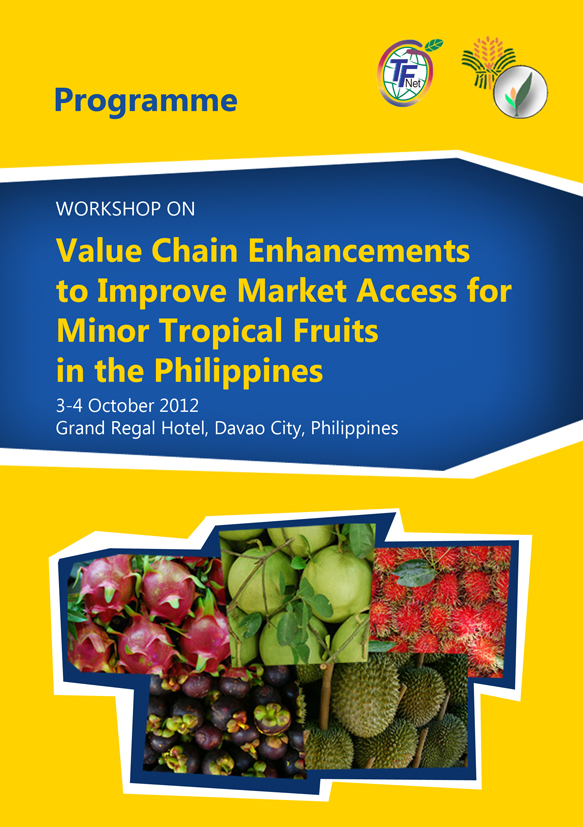Bearing the theme Value Chain Enhancements to Improve Market Access for Minor Tropical Fruits in the Philippines, TFNet and the Philippine Bureau of Plant Institute (BPI) conducted a workshop on 3-4 October 2012 at the Grand Regal Hotel in Davao City, Philippines.
Thirty-five participants, including heads of BPI departments, growers, extension officers, and researchers from the Philippines, attended the workshop. Experts from Malaysia, Vietnam, Philippines, and Indonesia presented their experiences in the cultivation, processing, and research focused on minor tropical fruits.
“The extensive knowledge and experiences [of the participants] will provide recommendations that can improve the minor tropical fruit situation against the backdrop of issues including postharvest losses, quality assurance, and market access,” said TFNet CEO Yacob Ahmad during his opening speech.
On behalf of Davao City Mayor Sara Duterte, City Agriculturist Leonardo R. Avila III graciously welcomed the participants. He hoped that the workshop can “assess issues and challenges in tropical fruit production and quality, empower farmers, and identify the interventions needed to improve the industry.”
Avila added that the workshop can help the participants identify ways to improve market access for fruits and increase trade in both domestic and export consumption.
BPI Director Clarito M. Barron and Assistant Director Henry T. Carpiso were also present in the opening.
Seven papers were presented to help participants identify the gaps along the tropical fruit value chain and recommended key activities and interventions that can help improve fruit quality, food safety, marketability, and meet international trade requirements.
Dr. Edna Anit of the Philippine Council for Agriculture, Aquatic and Natural Resources Research and Development (PCAARRD) provided an overview of the minor tropical fruit industry in the Philippines. The country invests on three major fruits – banana, pineapple, and mango – for domestic consumption and export. Minor fruits such as durian, jackfruit, langsat, and pummelo take the back seat, only produced for domestic comsumption.
Once the fruits are harvested, proper postharvest handling is of utmost importance. “Postharvest losses can range from 10%-50% of produce, greatly reducing profit,” said Dr. Emma Bayugan of the University of the Philippines Mindanao. Postharvest management can reduce these losses through techniques such as trimming, control of ripening, hot water treatment, packaging, and low-temperature storage.
“The demand for tropical fruits globally is increasing,” said TFNet CEO Yacob Ahmad. “Urban consumers are diversifying in taste, demanding for more fruit options that are safe and of high quality,” he added.
Exported fresh fruit, however, has to undergo stringer plant quarantine tests before it is approved. Certain countries like Malaysia minimally process fruits to bypass the rigid quarantine requirements. “Minimally processed fruits are ready-to-eat and packed in convenient containers while retaining fresh-like taste and aroma,” Latifah Mohd Nor of the Malaysian Agricultural Research and Development Institute (MARDI). Minimally processed jackfruit from MARDI is now being exported to Dubai, Singapore, and the Netherlands.
Dr. Dwi Iswari of the Indonesian Ministry of Agriculture discussed her country’s experiences in growing salak and mangosteen. Meanwhile, Vietnamese presenters Dr. Nguyen Thanh Hieu of the Southern Fruit Research Institute (SOFRI) and Dr. Nguyen Quoc Hung of the Fruit and Vegetable Research Institute talked about dragonfruit and pomelo, respectively.
The participants also visited the 350-hectare Davao Golden Pomelo farm managed by Carmelito Mercado. A value-chain analysis on pomelo was accomplished, identifying the current problems and recommended solutions.
[slideshow post_id=”1956″]

